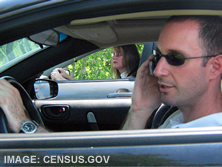|
Much has been made of how the fairly recent emergence of flip phones fulfilled the technological vision of the communicator device shown in the original Star Trek series in the mid-1960s.
 Cell phones now come in many sizes, shapes, and types and are quickly merging with personal digital assistants, MP3/video players, and other gadgets to take users far beyond the original functionality of simply making a phone call while on the go.
Cell phones now come in many sizes, shapes, and types and are quickly merging with personal digital assistants, MP3/video players, and other gadgets to take users far beyond the original functionality of simply making a phone call while on the go.
But is it all up-side? In this guest essay, Gene Sager offers an engaging parable on the subject.
~ ~ ~
A Message From Saint Francis About Cell Phones
by Gene Sager
When things get too hectic, I like to take a slow walk among my tangerine trees. One day I was able to quiet my chattering mind in this way. I sat on a big boulder and looked out across the valley to the wooded hills beyond. In a gap in the trees there seemed to be the image of a monk. Gradually the image became clearer and I recognized the figure of Saint Francis of Assisi.
He was holding his hand to the side of his head in a telephone pose, with his thumb to his ear and pinky to his mouth.
"Answer your cell phone," he said.
"I don't own a cell phone," I replied.
With an impish grin, Francis said, "That's ok, answer anyway." Obediently I put thumb to ear and pinky to mouth. Francis nodded approval.
We discussed many things that day, including cell phones, which seemed to be especially amusing to the saint.
Francis asked why I don't own a cell phone, and I haltingly replied that I wasn't sure but that I might get one since everyone has one these days and it would be convenient. If I forget the grocery list on the kitchen table, I could call home and get the particulars. Or I could notify people if delayed on the freeway.
At this Francis responded with a bemused smile, so I began to search my mind for bigger points, defending technology I didn't even have: "A lonely road, an accident, a sudden storm..." But Francis' smile disarmed all my contrived defenses, and I decided to flow along with his amusement and tell him about how cell phones provide an opportunity for exercise. Nowadays our thumbs get worked out mightily on the cell phone—dialing, answering, checking emails, texting, and so on. We are members of an elite class of animals who have opposable thumbs. Cell phone use is an excellent way to exercise our gift.
Francis surprised me with a story about a young lover who, in the throes of a passionate kiss with his girlfriend, was confused and humiliated by the vibrating cell phone in his front pants pocket. We howled with laughter as we discussed the cell-yellers who expose their family gossip in public places.
We recounted the story of the man who was dialing his cell phone while driving and ran off the road, annihilating a palm tree. Irony of ironies, it turned out to be a cell phone tower built in a fake palm tree. He couldn't get a signal after that.
And I told Francis about the tragic comedy of a call to my sister-in-law. I called her cell while she was attending the rosary for her recently deceased brother, a very sober occasion indeed. She had forgotten to turn off her cell phone and my call came bursting into the sober atmosphere to the tune of an upbeat song. She keeps her cell in the tangled mass of her purse with the ringer turned high. She rushed from the church accompanied by the festive strains of the "Mexican Hat Dance."
In a serious moment, Saint Francis agreed that for some businesses and some medical reasons, a cell phone is a reasonable and useful tool. He was not impressed with cells as parental monitors for teens because this may relax parental vigilance ("oh well, she has a cell") and because children may at times find convenient excuses such as "low battery" and "no signal."
Francis was most interested in people who don't really need a cell but have one anyway. Is it a safety issue?
 There is no doubt that all of us can describe a possible state of affairs in which possession of a cell phone would save us or others from harm or death. My favorite example is a solitary person with car trouble on a lonely road on a freezing night. Many peoples' star example is a woman walking to her car thorough a dimly lit parking structure.
There is no doubt that all of us can describe a possible state of affairs in which possession of a cell phone would save us or others from harm or death. My favorite example is a solitary person with car trouble on a lonely road on a freezing night. Many peoples' star example is a woman walking to her car thorough a dimly lit parking structure.
Rather than proposing ways one can avoid placing oneself in such circumstances, Saint Francis simply said this: "There is always danger. Should we all arm ourselves for a crisis every day?" He pretended to put down his cell phone and reach into his habit. He brandished a pretend pistol made of his pointer finger and thumb. Despite human advancements, Francis mocked modern technology, saying the birds have been twittering for millennia, and humans have only recently begun to twitter.
The saint sadly pronounced that we have a disease he calls "overkill syndrome." Our electronic capability far outreaches what we need. Cell phones, those shrinking magical conveniences, are a microcosm of a general malady in American society, said Francis.
Saint Francis then offered a much larger example of the same malady: SUVs. People who drive them have a vehicle built for extreme circumstances they will almost never face. Similarly, many new homes are monstrous—twice the size of those built in the 1950's—even though the average family is now smaller!
Saint Francis of Assisi was most concerned about how we can salvage some spiritual integrity in our frenetic overkill world. How on earth can we hear the still small voice within when we are chattering on our cell or preoccupied with recharging, playing games, turning on and off, checking messages, etc.? And the cell-yellers are invading public space and private space. What happens to our inner space, pray tell?
How convenient is it to be always "reachable"? Cell phones promise us the opportunity to be "connected" or "on call" much more often than land lines. Truth be told, eternal cell phone reachability makes us anxious and preoccupied on a deeper level." Reachability" means that even when our cell phones are off and we don't check messages, we still wonder what calls or messages we might have missed and who is miffed or worried about our failure to respond.
The jokester Francis was now serious. At the end of the day or at the end of our life, it is the deeper level that counts. Were our days frittered away with cell phone reaching and reachablility? The problem is not communication with family and friends but rather overuse of attention-demanding electronic tools of communication and leisure. Such preoccupation is a kind of entrapment.
Francis began to shake his cell phone hand and, in mock frustration: "Your cell needs a charge. Can you hear me now?"
I said I was cracking up but that I would get back to him. He faded away, and I hope he meant it when he said, in a singsong voice, "Talk to you later..."
I learned much from Saint Francis that day—about living in this hectic, hyperdriven society, about toxic materials in landfilled cell phones, and about reachability. Most of all I remember what he said about the deeper level and how to access it: slow down and quiet down, and find a place where you cannot be disturbed by cells, or beepers, or TVs, or cars, or....
Then you will have a signal. You will have access.
| Gene Sager is a professor of philosophy and religious studies at Palomar College. He writes articles on green issues and spiritual issues. His favorite activities are sauntering and moon watching. |
|
|
Know someone who might like this Cell Phone Distraction article? Please forward it to them.
You can sign up for our free email list so you don't miss anything! Options:
Books:
- See books related to
Cell Phone Distraction
More ....
|
|
|


